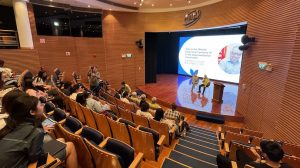Websites for convention and exhibition centres should focus on promoting the facilities and services available on-site, coupled with sufficient contact details and useful information about the host destination. That is according to a recent study involving a scholar from IFTM. The work also highlighted the need for adequate website management, including good content organisation and up-to-date information.
The research was produced by IFTM Lecturer Dr. Sherry Tan Xiuchang, in partnership with Dr. Rob Law from Hong Kong Polytechnic University. Their paper, titled “Website Functionality of Convention and Exhibition Centres: Important Performance Dimensions and Attributes”, was published last December in the online version of academic journal Event Management.
The researchers noted that an “effective website is important” as a promotion tool for any convention and exhibition centre. One reason is because site selection by event organisers “involves extensive long-distance information searching and communication”: a good website can help put a particular venue on the radar as a potential host for an international conference or trade fair, for instance.
Dr. Tan and Dr. Law pointed out that displaying “sufficient and appropriate information” in a website for a convention and exhibition centre is vital for inducing intention to purchase. The scholars said “irrelevant and insufficient information” on a company’s website could lead potential customers to turn to other providers in their search for a venue for their event.
The researchers suggested that convention and exhibition centres include on their corporate websites “rich information” about all types of venues available on-site, including detailed data about size, specifications and floor plans. Pictures and virtual tours of existing facilities were considered by the scholars value-added features to help potential customers to understand better the layout of the venue.
Other content that should be featured on a website of a convention and exhibition centre was information related to event planning in the host destination, said Dr. Tan and Dr. Law. Details about event service suppliers as well as tax and trading policies in the host destination were valuable for event organisers, the scholars explained.
The findings of the study were based on the outcome of a focus group discussion conducted to collect views from various stakeholders in the events industry. A total of 10 participants took part in the focus group, including event planners, industry association representatives (organisers and owners of events), professional conference organisers, staff of destination marketing companies, and venue operators. Participants came from Macao and the Mainland, and most of them had also been engaged in events in other parts of the world.
As part of their research, Dr. Tan and Dr. Law developed a framework for evaluating websites for convention and exhibition centres, drawing reference from existing models for hotel websites. Their framework included a total of 41 attributes – ranging from information about on-site logistics to details on transportation at the host destination – divided in 4 groups.
“Compared to hotels, convention and exhibition centres offer much more complex and flexible facilities and services,” the researchers said. “Therefore, a convention and exhibition centre website must focus heavily on its detailed venue specification, facilities, layout, equipment and related services, such as logistics and the use of electricity and water.”
The study findings suggested that some content and functions commonly present on a tourism business website were irrelevant for convention and exhibition centres. Interestingly, the researchers pointed out that having a function of making online reservation and payment was not useful for websites serving this kind of business.
“Although this function is perceived as one of the most important functions in a hotel website, it adds no value to a convention or exhibition website because of the greater complexity in the venue selection process,” Dr. Tan and Dr. Law said. “Transactions of an organisational buying behaviour will only happen with rounds of negotiation and compromises between the buyer and seller,” they added, noting that the amounts involved were also far greater than when reserving a hotel room.
More info
Dr. Rob Law joined Hong Kong Polytechnic University in 1995: he is currently a Professor at the School of Hotel and Tourism Management. He holds a PhD in Computer Science from the University of Regina, in Saskatchewan, Canada. Dr. Law has received many research-related awards and honours, as well as several external and internal research grants.
https://doi.org/10.3727/152599520X15894679115565









